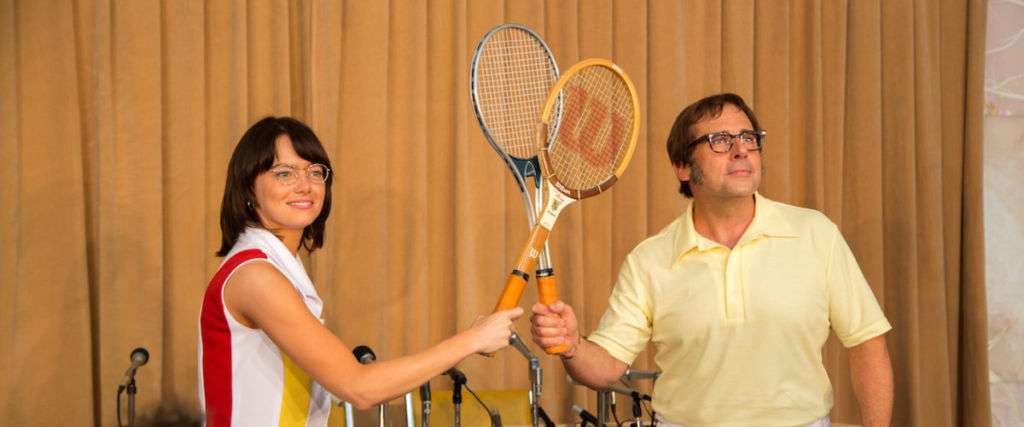 When I was coming out and learning about the various LGBT people who came before me, one of the images I saw repeated the most was the last shot of the absurdist tennis match called the Battle of the Sexes, when then-closeted Billie Jean King backhanded the ball past chauvinist huckster Bobby Riggs’s right and then he jumped over the net to shake her hand. Even though the whole event was clearly a money-making publicity stunt for Riggs, the result was an iconic moment for the women’s liberation movement in general and for women’s tennis in specific, and after King became the most famous lesbian in the world, for the gay and lesbian movement, too. Jonathan Dayton and Valerie Faris’ excellent, crowd-pleasing Battle of the Sexes explores the story’s historical importance, the players’ fraught emotional lives, and, yes, the ridiculousness of the whole thing.
When I was coming out and learning about the various LGBT people who came before me, one of the images I saw repeated the most was the last shot of the absurdist tennis match called the Battle of the Sexes, when then-closeted Billie Jean King backhanded the ball past chauvinist huckster Bobby Riggs’s right and then he jumped over the net to shake her hand. Even though the whole event was clearly a money-making publicity stunt for Riggs, the result was an iconic moment for the women’s liberation movement in general and for women’s tennis in specific, and after King became the most famous lesbian in the world, for the gay and lesbian movement, too. Jonathan Dayton and Valerie Faris’ excellent, crowd-pleasing Battle of the Sexes explores the story’s historical importance, the players’ fraught emotional lives, and, yes, the ridiculousness of the whole thing.
The film starts in 1973, when Billie Jean King, played with typical depth and charisma by Emma Stone, is 29 and has already won literally more than two dozen Grand Slam events in singles and doubles. She is one of the most famous athletes in the United States of either gender. Her and other women’s matches are as well attended as any of the men’s, but women players on the tour were being paid a tiny percentage of what the men were. United States Lawn Tennis Association, represented by its wildly sexist head Jack Kramer (Bill Pullman), refuses to increase the winnings; she and several other players form the Women’s Tennis Association and start a new, much better paid, tour sponsored by Virginia Slims.
While this is all going on, Billie somewhat reluctantly falls in love with Marilyn Barnett (Andrea Riseborough), a hairdresser who had done the WTA player’s hair for their first news conference. Of the many beautifully shot scenes is Barnett giving an agonizingly sensual haircut to King; it made me, a gay man, hot under the collar. But King is still married to Larry (Austin Stowell), and 44 years ago, lesbian athletes could not compete, let alone get endorsements. (King lost all of her endorsements when she was outed in 1981 by Barnett’s palimony lawsuit, though this is never mentioned.)
Steve Carell is perfectly cast as Bobby Riggs, one of the world’s top players of the 1940s now playing and winning on the seniors tour. A famous jokester and huckster, he has a gambling addiction, which is causing great strife in his marriage to Priscilla (Elisabeth Shue). Watching King complain about pay and form the WTA, Riggs decides that he can make a lot of money by declaring himself a male chauvinist pig and challenging famous feminist Billie Jean King to a match. She refuses, and he challenges King’s closest competitor and noted homophobe Margaret Court (Jessica McNamee). Court chokes and loses terribly. Now feeling that she has no choice but to play him, King agrees to a match that becomes a circus and is eventually watched by 90 million people.
Dayton and Faris made Little Miss Sunshine, one of the great feel-good movies of the last 20 years, and they create a similar thrill with Battle of the Sexes. They are replacing a child’s beauty pageant with a sports spectacle, but they retain the humanity even on the massive canvas. With Oscar-winner Simon Beaufoy’s script, they’ve crafted a film that mixes the tropes (sometimes clichés) of the standard sports movie (challenge, training, setback, thrilling conclusion) with those of a civil rights “issue” movie (injustice, fight, success) and a star-crossed love story (seduction, reluctance, resolution). We are so well trained by these tropes to love and support King that people in the audience I saw it with actually cheered during the recreation of the match – even though the result was a given. Even though Dayton, Faris and Beaufoy are working with obvious themes, they resist going too far. Riggs is not demonized; he is a struggling clown, not a supervillain. King knew this. They were close friends until he died in 1995.
Battles of the Sexes
Directed by Jonathan Dayton and Valerie Faris
Written by Simon Beaufoy
Starring Emma Stone, Steve Carell and Andrea Riseborough
Rated PG-13
Opens at your local multiplex Sept. 29
Originally published in LGBT Weekly
 When I was coming out and learning about the various LGBT people who came before me, one of the images I saw repeated the most was the last shot of the absurdist tennis match called the Battle of the Sexes, when then-closeted Billie Jean King backhanded the ball past chauvinist huckster Bobby Riggs’s right and then he jumped over the net to shake her hand. Even though the whole event was clearly a money-making publicity stunt for Riggs, the result was an iconic moment for the women’s liberation movement in general and for women’s tennis in specific, and after King became the most famous lesbian in the world, for the gay and lesbian movement, too. Jonathan Dayton and Valerie Faris’ excellent, crowd-pleasing Battle of the Sexes explores the story’s historical importance, the players’ fraught emotional lives, and, yes, the ridiculousness of the whole thing.
When I was coming out and learning about the various LGBT people who came before me, one of the images I saw repeated the most was the last shot of the absurdist tennis match called the Battle of the Sexes, when then-closeted Billie Jean King backhanded the ball past chauvinist huckster Bobby Riggs’s right and then he jumped over the net to shake her hand. Even though the whole event was clearly a money-making publicity stunt for Riggs, the result was an iconic moment for the women’s liberation movement in general and for women’s tennis in specific, and after King became the most famous lesbian in the world, for the gay and lesbian movement, too. Jonathan Dayton and Valerie Faris’ excellent, crowd-pleasing Battle of the Sexes explores the story’s historical importance, the players’ fraught emotional lives, and, yes, the ridiculousness of the whole thing.